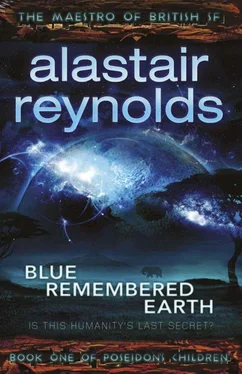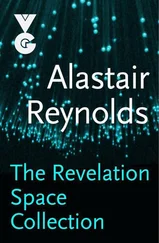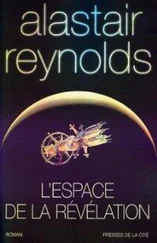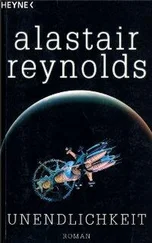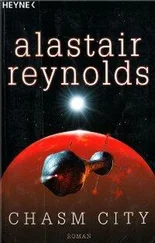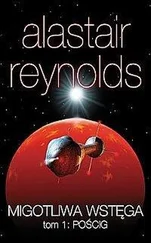‘Thank you,’ she said. And it was a heartfelt thanks, although it was only in this moment that she realised how much she had been counting on his help.
The airpod’s console chimed, pulling her back into its sensorium. She was nearing home.
When the hibernation casket brought him to consciousness, Geoffrey’s first intelligible thought was that there’d been a mistake; that something had gone wrong with the process and it must only have been minutes since the casket’s bioprobes had sunk their sterile fangs into his flesh and begun pumping his blood full of sedatives. It was a perfectly human response, after all. He had no memory of dreams, no sense of elapsed time. But it only took him a little longer to realise that matters were not as they had been when he entered the chamber. He was weightless, for one thing. They had been under thrust when he climbed in; now his body was at rest within the casket, cushioned against movement but otherwise floating, with the anxious feeling of falling in his belly.
A glass-mottled form drifted over him. His eyes tried to focus. They were bleary and the sudden intrusion of brightness and colour felt like a billion tiny needles pricking his retinas. He heard a clunk and felt cooler air touch his face. That was nice. The casket’s lid was sliding off him. The blurred form pushed itself closer and assumed the approximate proportions of a human woman.
‘Welcome back, sleepyhead.’
He grasped for her name. His memories weren’t where he’d left them. It was as if they’d been temporarily boxed away in an attic: still in his head, but poorly organised and labelled. Dimly, he began to realise that he might have been in the casket longer than his initial impressions had suggested.
‘Jumai?’ he managed.
‘Looks like we’ve got us a functioning central nervous system, at least.’ She hauled in closer still, fiddling with his restraints. ‘Hector was the first out. He’s been through this kind of thing dozens of times, so it was no biggie to him. I’ve been up about ten minutes. I think we’re all right, for the time being. The ship’s in one piece, and we’re… somewhere, I guess.’
Her words were arriving too quickly, like tennis balls spat out by a service machine. Geoffrey tried to formulate a question. ‘How long?’
‘How long have we been under? Fifty-one days, as far as Hector and I can tell, which is exactly what we dialled in at the start. It’s early May. Isn’t that weird? I skipped a whole birthday while we were out.’
Geoffrey winced as the bioprobes withdrew from his skin. He tried using his arms. They barely felt like a part of him. He had spent some of the Earth-Moon journey unconscious, but nothing about that had prepared him for the fifty-one days he’d been under while the ship took them wherever it was headed. Nonetheless, his arms responded, albeit sluggishly.
‘Muscle tone shot to shit,’Jumai said. ‘What happens when you spend seven weeks weightless. The engine must have cut off within a few hours of us going under; we’ve been coasting most of the way, except for the slowdown at the end.’
Systems in the casket would have done their best to prevent muscle wastage and loss of bone density, but Geoffrey knew nothing was as effective as simply moving around under plain old gravity.
He fumbled his way free of one of the restraints and began to drift out of the casket. Jumai arrested his motion with a gentle application of the palm of her hand. ‘Easy does it, soldier.’
‘We’ve stopped?’ he asked. ‘We’re still a day out, aren’t we?’
‘Ship must have shaved a little time off its estimate. As far as Hector and I can tell, we’ve reached our destination. He’s trying to verify that it’s the same place the ship said it was. I can tell you one thing already.’
‘Which is?’
‘Whatever shit we have to deal with out here, dying of sunstroke isn’t going to be part of it.’
Half an hour later, Geoffrey had made his aching and uncoordinated way up front to join Jumai and Hector in the command deck. All three were buckled into their seats, even though the ship was now floating at rest. They had not needed to provide further blood samples, and what limited control they had possessed before going into hibernation was still theirs. The ship was even willing to let Jumai access some of its top-level systems. She had assigned external views to two of the displays: one showing the view back towards the inner system, the other of the object they were now holding station from at twenty kilometres.
It was the view back home that chilled Geoffrey the most. It was one thing to be aware that they were now beyond the orbit of Neptune, well into the long light-hours on the solar system’s edge. Travel far enough, and that was what happened. It was another thing entirely actually to see how pitifully small and faint the sun now looked from this distance.
Geoffrey had never been further than the Moon in his life. The sun was now more than thirty times as distant as it appeared from his home, and the light it offered was over nine hundred times fainter. It was a bullet hole punched in the sky, admitting a pencil-shaft of watery yellow illumination, too feeble to be called sunshine. For the first time in his life he truly understood that his home orbited a star.
And he felt some sense of the true scale of things. That bullet hole was still the brightest thing in his sky, but he could imagine it shrinking, diminishing, sphinctering tight as he fell further into the outer darkness. Until even that pencil-shaft became just a wavering trickle of ice-cold photons.
He smiled at that, because he had not even come a thousandth of a light-year.
The sun might have been the brightest thing in the sky, but it was not the largest. The iceteroid, which sat in the opposite direction – its visible face illuminated – was fifty kilometres across at its widest point. It was a dark-red potato, its hidelike surface only lightly cratered. Like all Kuiper belt objects, it had been ticking around the sun largely unmolested for more than four billion years. Once in a stupendous while, the gravitational influence of one of the major planets might kick a Kuiper belt object onto a cometary orbit. For the majority of objects, no such glory awaited. They would spend their existences out here, going about their lonely business until the sun swelled up. If, that was, humanity’s machines did not arrive first, to tap their riches.
‘Is it ours?’ Geoffrey asked.
‘If we are where the ship claims to be, then this is Lionheart,’ Hector said. ‘We should be able to cross-check that in a little while, but for the moment I see no reason to doubt it. We’ve come a long way, and that’s pretty obviously an iceteroid.’ He dragged his gaze from the display for a second to meet Geoffrey’s eyes. ‘How are you feeling?’
‘They say it gets easier.’
‘It does. But fifty-one days is a long stretch even for the seasoned space traveller. The cabinets are modern, though. There should be no lasting effects.’ He nodded at one of the schematic diagrams. ‘The ship has even redeployed its centrifuge arms. It wants us to be as comfortable as possible. We should all think about spending some time under gravity, even if we have to do it in shifts while someone monitors things from up here.’
‘You say the cabinets are modern,’ Geoffrey said.
‘Hitachi have been making them for a long while, but the ones we just used are not sixty-two years old.’
‘You said that’s how old the ship is,’ Jumai said.
‘Its basic systems are that old,’ Hector replied, ‘engine, hull, life-support, everything it needed to get back to Lunar orbit. Since then, though, it must have been outfitted with brand-new internal equipment. I suppose the cabinets may have been manufactured onboard, if the repair systems had the right materials and blueprints. But it’s far more likely that they were simply bought and shipped up to the Winter Palace.’
Читать дальше
